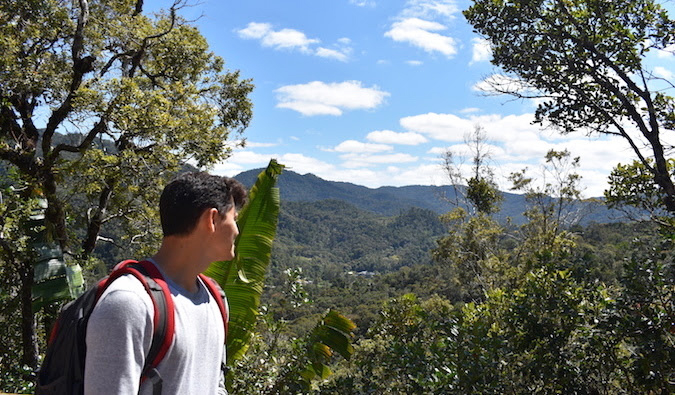
As I approach my ten-year anniversary of blogging, I want to tell a tale. The tale of an accidental travel writer who simply wanted to afford beer, dorm rooms, plane tickets, and backpacker pub crawls.
I shared part of this story before but, today, I want to go into more depth.
Once upon a time, I started this website with a selfish goal: to make money to keep myself traveling. I wanted my website to be an online résumé where editors could see my writing and go, “Yeah, we want to hire that guy!” — and then pay me to go somewhere and write a story about it. I imagined myself a cross between Bill Bryson and Indiana Jones. My dream was to write guidebooks for Lonely Planet. I imagined no cooler job than a guidebook researcher.
Anything was better than working in the cubicle I was sitting in at the time.
These days, it’s not about how I can keep myself traveling. It’s about how I can help others travel. Every day, the team and I constantly ask ourselves: “How do we help and inspire others to travel cheaper, better, and longer?”
Today, it’s all about you.
But, back then, the only thing I ever said was “How do I help myself?”
So how did I get from a “me centric” to a “reader centric” website?
In those early days, I worked as an English teacher in Bangkok and Taiwan. Blogging was never meant to support me full–time — let alone lead to book deals, conferences, speaking events, and so much more.
In fact, I didn’t care much about this website. I mean, sure, worked on it and didn’t want it to fail. I wanted it to become popular.
But building it into something bigger than myself was not the goal.
Instead, I wanted the dream: passive income. I wanted money to be coming in while I slept.
I was 27 with no responsibilities. I wasn’t looking toward the future. I just wanted the good times to never end.

While I earned a little bit of money from affiliates and selling links on this site (back in those days, you could make a lot of money selling text links to companies looking to artificially increase their Google ranking), I spent most of my time creating AdSense websites, designed solely to get people to click on Google ads. Yes, I was a scammy internet marketer!
I put all that money I made back into these websites — getting people to write articles, optimizing the websites for search, and creating more websites — and lived off my teaching income.
I found keywords that paid well and designed very niche and ugly websites around those subjects. I had websites on teaching English, growing corn, taking care of dogs and turtles, and even raising pigs. At one point, if you went searching for advice on how to train your beagle, every website on the first page was mine.
Yes, those were some weird days. All the content was legit (I hired dog trainer friends to write the articles), but the websites lacked soul.
As time went on, between this website, my teaching job, and those AdSense sites, I made more than enough money, earning upwards of $8,000 a month.
Then one day it all changed.
I was part of this group called the Keyword Academy. It was run by two guys from Colorado, Mark and (I think) a guy named Brad. (We’ll call him Brad for this story.) As part of my membership, we had monthly consulting calls. During one, Brad said, “Matt, why are you building this crap? You know travel. You have a website that people read and like. You have a skill set. Focus on that. This shit is stupid. We only do it because it’s quick cash.”
And he was right. That shit was stupid. All I was doing was taking advantage of the fact that Google couldn’t differentiate spam websites from real websites. Travel was really my passion.
So, in late spring 2009, I shifted my focus back to this blog and, over time, let those other websites die or sold them off. (They made money for about a year after I stopped updating them.)
And, when Google finally learned to filter those spammy websites out, all the people I knew from those days were left with nothing. I have no idea what they do now. It’s certainly not running websites as I’ve never come across their names again.
But the experience taught me some important lessons about creating an online business:
First, until your hobby can pay your rent, don’t quit your day job. There are a lot of people telling you to “follow your passion” — but they neglect to tell you that unless your passion can pay your bills, you should keep your “unpassionate” day job. Teaching English and those scammy websites allowed me to have some income while I focused on “Nomadic Matt.” It wasn’t until the end of 2009 / early 2010 that Nomadic Matt earned enough where I needed no other sources of income.

Second, no matter how good or helpful your blog is, marketing is important. If no one knows how to find your website, it’s all for naught. Those crappy, scammy websites taught me how Google and SEO worked as well as the importance of marketing and messaging. I took that experienced to improve this website, optimizing my content for Google, created products, and started networking with bloggers outside travel.
I think this is one of the things that gave me an edge over other bloggers at this time. While they focused solely on writing and social media, I focused on that as well as SEO. This ensured that I ranked high in search engines, got visitors every day, and helped get my “brand” other there (I got interviewed on CNN once because the writer found me on Google).
And, as I built this community and saw my friends’ incomes collapse with the change of an algorithm, I learned the most important lesson of all: when you create a business that helps others, you create something sustainable and gives meaning and joy to your own life. I hated those other websites but I will work 24/7 on this one because I love what I do.
I don’t agree with basically anything I did in those early days. It was a very scammy way to make money. But I don’t regret one moment of it because it showed me a better way and helped get here. I guess the saying is right. When you find a job you love, you’ll never work a day in your life.
P.S. – If you’d like to learn how to start a blog the right way, avoid my early mistakes, and get a peek at all the processes and methods I use to continue to grow this website (without scammy ads), check out my blogging course. It gives you all my secrets as well as direct feedback on your website from me and tech support from my tech team.










